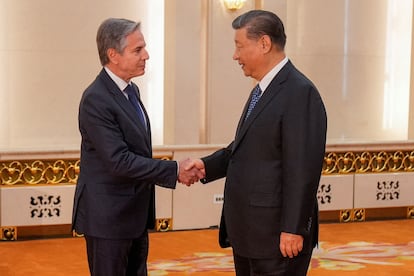Blinken meets with Xi in Beijing to try to improve US-China relations
The U.S. secretary of state ended his trip with a meeting with the Chinese president, who said the two countries should be ‘partners rather than rivals’

China and the United States remain willing to preserve the recent — and fragile — stabilization of bilateral ties, but recognize that “active diplomacy” is necessary to avoid “misunderstandings and miscalculations.” That’s the main message from U.S. Secretary of State Antony Blinken’s three-day visit to China, his second in 10 months. His last stop, which took place on Friday in Beijing, was marked by a nearly six-hour meeting with Chinese Foreign Minister Wang Yi and a brief meeting with Chinese President Xi Jinping, which, as was the case last June, was not on the official agenda. This meeting has been taken as a sign that things have gone relatively well.
“Over the past 45 years, the relationship has gone through wind and rain, and the two sides can draw a few important lessons: China and the United States should be partners rather than rivals; help each other succeed rather than hurt each other; seek common ground and reserve differences rather than engage in vicious competition,” Xi confided to the American, according to the official reading provided by Chinese authorities.
“I’ve said many times that the planet is big enough to accommodate the common development and respective prosperity of China and the United States,” Xi said during the meeting in the Great Hall of the People, the stage for major political events. Xi said that China was “happy to see a confident, open, prosperous and thriving United States. We hope the U.S. can also look at China’s development in a positive light.”
The division between the two powers came to the fore hours before Blinken landed in China, when the U.S. Senate approved a bill that provides $8.12 billion to “counter communist China” in the Indo-Pacific and another that forces ByteDance, the Chinese technology company that owns TikTok, to sell the platform within nine months or else face a ban. Blinken told the media in Beijing that the issue of TikTok was not mentioned in the meeting.
The broad and thorny agenda hinted that the meeting points would be limited. The war in Ukraine occupied much of the conversations. Blinken raised concerns with Xi that Chinese companies are helping to re-equip and resupply the Russian defense industry with components for weapons manufacturing. “Fueling Russia’s defense industrial base not only threatens Ukrainian security, it threatens European security. As we’ve told China for some time, ensuring transatlantic security is a core U.S. interest. In our discussions today, I made clear that if China does not address this problem, we will,” Blinken said in a press conference. The secretary of state, however, avoided giving details of the response he received and whether he outlined what measures Washington could take against these companies.
China and the U.S. are aware that the enormous and growing divergences between the two powers mean that the slightest change could hurt the progress they have achieved in the last year. Twelve months ago, ties were at their lowest point in decades after Washington shot down an alleged Chinese spy balloon crossing U.S. territory without permission. But relations had been sour since 2002, when then U.S. House speaker Nancy Pelosi visited Taiwan — a trip that sparked unprecedented military maneuvers by China around the island. Thanks to intensive diplomatic efforts between officials of the two giants, talks have become much more routine, allowing the world’s two largest economies and rival geopolitical powers to improve their tense but interdependent relationship.
Prior to the meeting with Xi, Blinken met at the Diaoyutai State Guesthouse with his Chinese counterpart, who received him with tougher words. Wang conceded that, after the Xi and Biden summit held last November in San Francisco, “relations have stabilized” and there has been growing cooperation and positive progress in various fields. However, “negative factors are still increasing and building,” said Wang. “China’s legitimate development rights have been unreasonably suppressed, and our core interests are facing challenges,” he told Blinken.
In front of the cameras, Wang said that their two countries could either “keep to the right direction of moving forward with stability or return to a downward spiral” or even “slide into confrontation.” He also stressed that Washington “must refrain from interfering in China’s internal affairs and from crossing its red lines regarding its sovereignty, security and development,” a clear reference to Taiwan, the democratically self-governed island that China considers an inalienable part of its territory.
Russian President Vladimir Putin confirmed on Thursday that he will travel to China in May, but did not provide further details. Putin last visited China in October. Reuters also reported on Thursday that a U.S.-sanctioned Russian freighter has been docked at a shipyard in the eastern Chinese province of Zhejiang since February. It is the Russian vessel Angara, which has moved thousands of containers allegedly containing North Korean munitions to Russian ports since August 2023.
Blinken was accompanied on his trip by Todd Robinson, Deputy Assistant Secretary for International Narcotics and Law Enforcement Affairs, and Nathaniel Fick, Ambassador-at-Large for Cyberspace and Digital Policy. U.S. officials expect China to make progress in stopping chemicals used to manufacture fentanyl from coming into the United States.
Blinken arrived in Beijing on Thursday from Shanghai, where he urged authorities to offer a level playing field to U.S. companies. His trip comes two weeks after U.S. Treasury Secretary Janet Yellen visited China. On her visit, Yellen made it clear that the U.S. remains wary of Chinese economic practices and warned of the “risk” and “negative effects” of China’s massive investments in advanced manufacturing of clean energy goods.
Sign up for our weekly newsletter to get more English-language news coverage from EL PAÍS USA Edition
Tu suscripción se está usando en otro dispositivo
¿Quieres añadir otro usuario a tu suscripción?
Si continúas leyendo en este dispositivo, no se podrá leer en el otro.
FlechaTu suscripción se está usando en otro dispositivo y solo puedes acceder a EL PAÍS desde un dispositivo a la vez.
Si quieres compartir tu cuenta, cambia tu suscripción a la modalidad Premium, así podrás añadir otro usuario. Cada uno accederá con su propia cuenta de email, lo que os permitirá personalizar vuestra experiencia en EL PAÍS.
¿Tienes una suscripción de empresa? Accede aquí para contratar más cuentas.
En el caso de no saber quién está usando tu cuenta, te recomendamos cambiar tu contraseña aquí.
Si decides continuar compartiendo tu cuenta, este mensaje se mostrará en tu dispositivo y en el de la otra persona que está usando tu cuenta de forma indefinida, afectando a tu experiencia de lectura. Puedes consultar aquí los términos y condiciones de la suscripción digital.









































